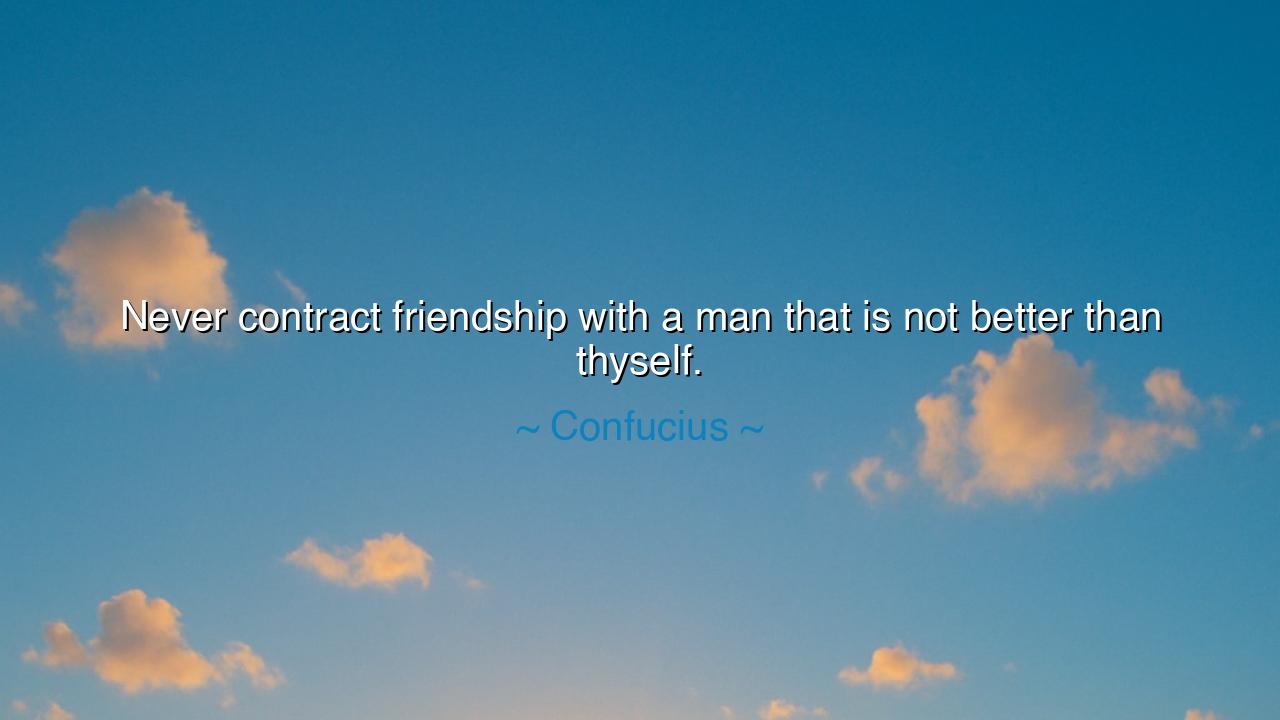
Never contract friendship with a man that is not better than






Confucius, the Sage of the East, once spoke a truth as sharp as a sword and as enduring as stone: “Never contract friendship with a man that is not better than thyself.” In these words lies a teaching both humbling and elevating, for they summon us to seek friendship not as comfort, but as cultivation — not as the echo of our weaknesses, but as the mirror of our highest potential. To the Master, friendship was not a mere exchange of affection or convenience; it was a sacred bond that shapes the soul. The company we keep becomes the soil in which our spirit grows — rich and nourishing, or barren and corrupting. Thus, he warned that to befriend one lesser in virtue is to plant seeds in poisoned earth.
The origin of this teaching lies deep in the moral philosophy of Confucius, who believed that all human excellence flows from self-cultivation. For him, the path to wisdom was not walked alone. A man’s character, like metal, is sharpened by the tools around it. Friends, therefore, are the forges of virtue — and one must choose those whose fire purifies, not those whose smoke chokes. “When you walk with the wise,” he taught, “you become wise; when you walk with the base, your heart will darken.” Thus, to seek friendship with those greater than oneself is to choose growth over comfort, light over shadow, and discipline over ease.
There is an ancient tale that illuminates this truth. In the age of the Greek philosophers, a young man came to Socrates, eager for knowledge. Socrates led him to a river and pressed his head beneath the water until he struggled for breath. When he finally let him rise, gasping, the youth cried, “Master, why do you nearly drown me?” Socrates replied, “When you desire wisdom as you desired air, then you shall find it.” So too is it with friendship. Seek not those who flatter you, nor those who mirror your faults. Seek those who challenge you to breathe deeper, to rise higher, to become more than you are. For the friend who is better than you is the one who teaches you to thirst for greatness.
Yet to follow this teaching requires humility. The proud man surrounds himself with the weak, for they make him feel strong; the wise man surrounds himself with the strong, for they make him better. Confucius understood that the ego craves admiration, but the soul craves truth. The former seeks companions who praise; the latter seeks companions who correct. The true friend does not comfort your mediocrity — he awakens your excellence. His presence is a light by which your flaws are revealed, not hidden. To walk with such a person may wound the pride, but it heals the soul.
Indeed, history honors those who rose by the company of the virtuous. Consider Alexander the Great, who as a youth was taught by Aristotle, the wisest mind of his time. From that friendship of master and pupil came the shaping of a conqueror — not in arms alone, but in thought, in discipline, in the belief that greatness is born of learning. Had Alexander surrounded himself with flatterers instead of philosophers, his empire might have been vast in land but small in spirit. His example shows that the one who walks beside the greater is lifted by their stride.
But let us not mistake Confucius’s counsel for arrogance. He did not mean that we should scorn the simple or withdraw from those who falter. Rather, he meant that the heart must discern the direction in which it is drawn. Friendship is a tide: it either carries us upward or pulls us down. To bond too closely with those careless of virtue is to be gently, slowly undone — for corruption does not come with thunder, but with whispers. Better to be the least among the noble than the first among the base. For even the smallest ember among the stars burns brighter than a torch in the swamp.
Thus, my children of wisdom, take heed of this teaching: choose your friends as you would choose your destiny. Let your companions be those whose words sharpen your mind, whose deeds strengthen your character, and whose presence calls forth your better self. Be not afraid to feel small among the great, for that smallness is the beginning of growth. Seek counsel from the just, learn from the wise, walk with the humble, and you will never stray far from truth.
And when you become better — when wisdom and virtue have taken root in your heart — do as the ancients did: become yourself the kind of friend others may rise beside. For to live by Confucius’s words is not merely to seek great company, but to become worthy of it. Then friendship will no longer be a choice, but a harmony — a meeting of souls ascending together toward the light.






AAdministratorAdministrator
Welcome, honored guests. Please leave a comment, we will respond soon